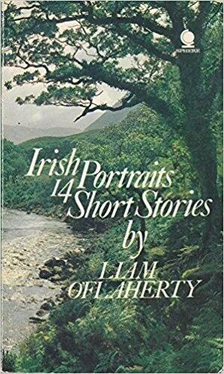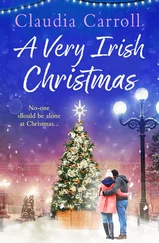“Maybe I am,” said Martin.
He got into bed beside his brother, but he lay awake all night, thinking.
Next day, while they were at the seashore loading seaweed on the mare, Martin said to his brother:
“Have you still got a mind to do what you were talking of last night?”
“I have,” said Patrick.
Martin brought the loaded mare to the field, dropped the load and returned. Then he said:
“Very well. We better go home at noon and dress ourselves. A settlement has to be made
“We’ll do that,” said Patrick, “in the name of God.”
“I hope God will bless it,” said Martin gloomily.
In the afternoon, Patrick went on the mare to the town and returned with a bottle of whisky. After dark, they went with their uncle and another man to the house where Kate Tully lived with her married brother. They made the match. Martin agreed to everything they said. He appeared to be quite satisfied. It was decided to have the marriage in a week’s time. Next day they went to the parish priest to sign the agreement.
There were thirty acres of land, a horse, a cow, a bullock, a yearling calf, the house and furniture and a boat. Martin gave his share of all this property to his brother, excepting his share of the boat. The boat was to be owned in common by the two of them. In return, Patrick gave Martin his share of their common savings, which amounted to four hundred pounds. It was arranged that Martin should go on living in the house until he married. He was to receive one-fifth of the house’s earnings, in return for his work.
The priest tried to point out to them that this arrangement might cause some difficulty later on and that it was better that Martin should at once set about making a home of his own, but Martin refused to hear of it. He said he was now too old to marry.
Kate Tully also had a clause inserted in the agreement to the effect that, in case of her death, her son Charles should inherit the property equally with any children she might have by Patrick. Patrick agreed to this after some argument.
After they had signed the agreement, they went to celebrate in the town, but Martin refused to accompany them. Neither did he give any assistance in the preparation for the wedding. He went about his ordinary work.
Patrick, on the other hand, went about in his best clothes, talking loudly, drinking, superintending the preparations, treating all his friends with the extravagance of a mean man carried away by a sudden passion. He hardly slept at all.
“Why don’t you drink with me?” he said to Martin. “Why are you gloomy? Have you anything against me?”
“This is not a time for drinking and merrymaking,” said Martin. “It’s your prayers you should be saying approaching a sacrament, instead of leering at the thought of your marriage bed.”
“Pruth!” said Patrick. “Bloody woes! What a monk you are!”
Martin heard the people whispering and mocking at his brother, because he was going to marry a withered woman, who already had a child. Children, as is the custom when there is a marriage in a house, used to call after him, shouting: “Kate Tully.” Instead of paying no attention to this harmless teasing, he was deeply mortified,
Patrick spent money freely on the preparations. His uncle’s wife and two other women were brought in. They scoured out the house, whitewashed it, put curtains on the windows, delft on the dresser, new sheets on the beds. whiskey, porter, wine and a large quantity of food was purchased. A sack of flour was baked into bread.
The whole countryside came to the wedding. The kitchen and the two bedrooms were packed with people. Only a few had room to sit in the kitchen. The rest stood, row behind row, around the little space in the centre where couples were dancing. A man sat on a chair near the fire playing an accordion. Three men went round serving whiskey and porter. Out in the yard there was a group of young men, drinking heavily, boasting and discussing feats of strength. In the bigger bedroom, where the marriage bed was prepared, people were eating in relays. Women passed back and forth, carrying teapots from the kitchen fire. Other women hustled guests to the table. Patrick went around shouting, already quite drunk, urging everybody to be merry. There was an air of reckless savagery and haste about the whole thing, and the older people noticed a lack of decency and of respect. They where whispering to one another.
Martin, sitting gloomily in a corner of the hearth, noticed that people had no respect for the house or for the marriage. He heard the whispering. He felt terribly ashamed and angry. He thought it was about him they were whispering, that they were jeering at him. So he refused to eat or drink. He sat without movement, with his eyes on the fire. He wanted to get up, leave the house and stand on the cliffs, looking out at the sea; but he would not move, lest they might jeer still more at him for running away. And yet it was a torture to stay. He was aware of the little boy, Kate’s son, who was sitting in the opposite corner of the hearth. He was aware of Kate herself, who sat in triumph near the musician. He hated them all. Henceforth they would all be in the house with him. He would stand naked before the people, a butt for people’s scorn. So he thought.
Every time Kate spoke in her loud, gay, rasping voice, he shuddered. And yet he could hardly restrain himself from looking at her.
Everybody was watching her and she seemed partly to enjoy the attention she attracted and partly to resent it. She sat with her legs crossed. Her dress was so short that a red garter showed on her thigh above the knee. She kept tapping her foot on the floor and pulling down her skirt that refused to go any farther than the brink of her knee. Her legs were beautiful. She wore silk stockings. Her dress was gaudy. It was red. Her cheeks and lips were painted. She was very slim and she had an exquisite figure. But her broad shoulders were bony. Her chest was flat. Her hair was dyed a yellowish colour. Her face bore the remains of great beauty. But her eyes were hard and her mouth was coarse. Although she was only thirty-five years of age she looked old. All that was left of her youthful beauty was a skeleton. She had, however, that power of attraction which comes of knowledge. The coolness of her manner, the cynical, brusque way in which she spoke, the glitter in her strange eyes were more exciting than the freshness of young beauty. She kept smiling. Her smile was contemptuous. With her mouth she enjoyed her triumph. But her eyes sometimes had a look of fear in them.
Her son was even more strange than she. He was six years old, pale, delicate and shy. He looked alien. His skin was yellow. His ears were large and strangely fashioned. His neck was long and thin. He had hardly a chin. His wrists were like spindles. His thin legs bent inwards at the knees. His upper teeth protruded. He kept eating sweets from a paper bag and looking casually at the dancers, without any excitement.
Patrick kept going up to his wife and putting his arm around her and saying:
“I have you now.”
Then he got so drunk that they put him lying on the marriage bed in the big bedroom. Then Kate danced with the young men and drank punch in the little bedroom with the women.
When it was nearly dawn, Patrick awoke from his drunken sleep, drank some whiskey and came into the kitchen. He went up to his wife and began to caress her passionately in front of the people, mumbling:
“I have you now.”
The guests began to leave. Martin heard them laugh as they went away, shouting: “I have you now.”
Before they had all left the house, Patrick dragged his wife into the bedroom and locked the door. The little boy lay asleep in the corner of the hearth, forgotten. The uncle was the last to leave. He said to Martin:
Читать дальше












